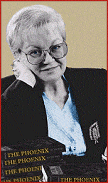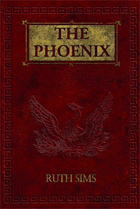
 William
Maltese, prolific writer, takes time out of his schedule to interview
new writer, Ruth Sims, author of The
Phoenix
William
Maltese, prolific writer, takes time out of his schedule to interview
new writer, Ruth Sims, author of The
PhoenixImmediately following this interview is William's take on The Phoenix
RUTH SIMS (RS): TWC is hard to explain because it's something new. It's both self-publishing and full-service publishing. Self-publishing because the author foots the bill and makes the profit; full-service because of the contracts TWC negotiates with printers, distributors, warehousing, cover artists, graphic designers, editors etc., and TWC’s insistence on top-of-the-line editing and production values. TWC books often receive major reviews, and can be found on-shelf in brick-and-mortar bookstores because TWC provides standard industry discounts and return options, just like the Big Boys such as Random House. Return options are, of course, the insane side of publishing.
WM: Just how does a heterosexual cookie-baking grandmother, born and raised a Fundamentalist Christian, smack dab in the middle of the conservative middle America, end up writing a Victorian novel with two gay guys as her chief protagonists?
RS: If I ever figure it out I’ll let you know. Certainly, I had no initial intentions of writing a “gay” novel. I didn’t even consciously know anyone who was gay, at the time, nor had I ever read a book with obviously gay characters, unless you count the questionable possibilities offered by the relationship of David and Jonathan in the Old Testament. I set out to write a straightforward (no pun intended) mainstream story, and the characters — as they sometimes do — just took off on their own tangent. After several years of trying, I stopped fighting them and let them be what they were. Like any wise parent.
WM: Speaking of “several years of trying”, is it true that THE PHOENIX was twenty years in the writing because of all your in-depth research done on the Victorian era and on the Victorian novel?
RS: It did take twenty years, off and on, although I think that had more to do with my trying so hard to “get it right.” I did countless rewrites and endless proofing, then rewrote the proofs and re-proofed the rewrites! Under careful analysis, the book actually depends very little on physical details, especially when compared to other books I’ve read. Some go so far as to describe every detail of the wallpaper pattern and the intricacies of making glass beads for Victorian bonnets. That’s fine as long as those things actually have something to do with the story. As for the Victorian novels, I do read books like Wuthering Heights, Jane Eyre, Tess of the d'Urbervilles, Madame Bovary… not for research but because I genuinely enjoy them.
WM: And by way of your researching the homosexuality of the period?
RS: Not an easy thing to do, I’ll grant you. Homosexuality, back then, simply wasn’t an open subject for polite discussion, conversation, dissertation, or publication. Nick's wife [in the book] — and most of her fair-sex peers — would likely have been completely ignorant of the subject. I think societal ignorance made it easier than most of us imagine, for a man or a woman to “hide in plain sight,” as it were. The subject of homosexuality simply did not come up, except in a rare case like that of Oscar Wilde that became an international scandal. The word “homosexual,” by the way, was not coined until around 1892 and was not in general usage until long after that. Until the law was changed in 1861 a British homosexual could be sentenced to death, though the last execution was in 1835. After 1861, he could be sent to prison at hard labor.
WM: Is it true that the gay aspects of your novel have caused you to be alienated from certain members of your family?
RS: Alienated is too strong a word. They’re conservative, and there's no doubt that if my characters were straight my family would be much more comfortable with my writing. As it is, they won’t willingly look at the physical book or ask about it, let alone read it. It’s the elephant in the corner of the room, the one you pretend is not there. The only real alienation in my life is between me and organized religion. I was brought up with Sunday School, two church services every Sunday, youth meetings Sunday afternoon, at least two annual week-long revival meetings… well, you get the idea. I left that all behind after having seen how much prejudice and injustice there is in the church. My family and some long-time friends are conservative Christians, so there are things we just don't discuss, including my novel. By way of an “aside”: Some of the most devout Christians I've met have been gay, in spite of how Christianity generally treats them.
WM: What do you think of the theory that today’s reader, in general (raised on quick-fix fast foods and fast video games, and fast story-lines presented in one-hour television increments), simply isn’t “wired” to take the time and make the effort required to maneuver the plot and character intricacies of a 344-page book like THE PHOENIX?
RS: I’d say it’s not a theory at all. It’s a sad fact. It always surprises me when people refer to THE PHOENIX as a long book. Depends on your perspective. Since I love long books, it’s just average to me. I’m no expert, but I think part of the problem is not only the availability of “quick-fix” entertainment, but simply the hectic and over-scheduled lives a lot of people lead. Reading takes time. Reading takes quiet. Reading takes desire. It’s easier to just flick the button on the remote when you’re tired.
Recently I had the opportunity of talking to some “MTV-age” kids. Bright, articulate, ambitious, smart as they come. Wonderful kids. But few of them read for fun; many of them have never read for fun unless you count MAD and teen magazines. Between TV and the computer everything is set out visually for them and far too many of them have very little creative imagination. The existence of the very long and very popular Harry Potter books is encouraging, however.
WM: Do you think there’s an existent present-day bias against women, especially against straight women, writing gay books from a gay-male standpoint, as you’ve done in THE PHOENIX?
RS: I only know that A. Tobias Grace, Patricia Nell Warren, and my publisher seem to think that is sometimes the case. And I’ve been told by at least one book store owner, and a couple of book clubs, that a gay man won’t read a gay book written by a woman (gay or straight). But that can’t be entirely true, can it. Warren is a best-selling author, but in the beginning I know she had to struggle against the prejudice. The late Mary Renault is another top-selling female author. And I have had rave reviews for my book which were written by gay men who have then gone on to be genuinely helpful and encouraging. Some of them have become my very good friends. Really, I think I’ll just have to wait a little longer and get back to you on the bias question, since my book has been on the bookshelves only since September 2004.
May I put in a plug? THE PHOENIX is carried by an increasing number of brick-and-mortar gay bookstores since it's available through Ingram and Baker & Taylor. It's in the Borders warehouses and on Borders’ shelves. Any chain or independent bookstore can order it. It’s readily available on amazon.com and barnesandnoble.com.
WM: And, will we have to wait another twenty years for your next novel?
RS: I hope not. If you did, I’d be finishing it in the Bide-A-Wee Nursing Home. Actually, I’ve several projects in different stages of development. The one on which I'm concentrating at the moment, is a gay Victorian/Edwardian novel featuring, among other things, a cultural and class clash between a young gypsy and “respectable” British society. It’s tentatively titled "Counterpoint." I’m actually hoping for a 2006 publication date for that one, but don’t hold your breath.
WM: I’ll be looking forward (and, hopefully not turning blue). Thanks for the interview.
RS: Thank you.
-30-
 WILLIAM
MALTESE JOINS THE LONG LINE IN REVIEWING…
WILLIAM
MALTESE JOINS THE LONG LINE IN REVIEWING…THE PHOENIX
ISBN: 1932133402
by Ruth Sims
The Writers’ Collectiive
September 2004
$16.95
When do additional bells rung, clackers clacked, drums beaten, chimes chimed, rockets fired, and bullhorns put to mouths — all to announce the arrival of a really good gay book on the bookshelves — become one too many bell rung, clacker clacked, drum beaten, chime chimed, rocket rocketed, bullhorn used to increase the volume?
Though you may well think that you’ve already become too much inundated in the recent tsunami of acclaim for THE PHOENIX that’s “out there”, and “in here” (AKA “IGW”), bestowing accolades on Ruth Sims’ twenty-years-in-the-writing Victorian novel of the love between two gay men … though you may well approach this review with the chagrin of someone who thinks himself or herself already on the verge of drowning within the deluge — “Enough is enough!” you may well be screaming … I’m here, as a university major in advertising/marketing, to tell you that “too much” is really never considered “nearly enough” in the advertising/marketing business, as it concerns garnering consumer awareness. That’s why you so often find the same advertisement played time after time after time on your television screens and sometimes find the very same ad aired more-than-twice-in-a-row.
The name of the game in marketing is getting the product recognized by the potential buyer. If that initially seems downright annoying to the consumer, research has proved that annoying is “okay”, in that, in the end, annoying provides the incentive for a buyer to recognize the product when he sees it, to pick it up, (annoyance momentarily replaced by, “Why does this look so familiar?”), and to buy it and take it home.
So, merely consider this my addition to the bell ringing, clacker clacking, drum beating, chime chiming, rocket rocketing, bullhorn shouting, and my personal effort to try and assure that no potential reader out there, in the big wide world of Gaydom, fails to be aware that Ms. Sims’ truly masterful novel is worthy of being read by those who want a truly unique reading experience.
I’m not guaranteeing an easy read. In this day and age of quick fixes and go-go-go instant gratifications, it’s more and more difficult to carve a bit of time out of our schedules to sit down somewhere (television and video games and cell phones and iPods turned off), fire in the fireplace, glass of chilled wine nearby, the tactile pleasure of a book-in-hand, to rediscover the pure joy of reading something that requires a bit more time and effort (and, yes, “grey matter”) than most of the fast-read “stuff” (my stuff included) that’s presently available.
I am convinced that if you make the time and take the effort that it’ll be worth your while, if just because I suspect it will be a considerable time before you find the likes of Ms. Sim’s THE PHOENIX appearing in any book stores again — if ever — and you owe it to yourself, just once, to experience a book (a gay-themed one to boot) that spans decades and continents and is filled with twists and turns of plot and rich character development, the likes of which once entranced generations before televisions, and before video games, and before cell phones, and before iPods ….
Readers used to an ever-increasing fast life-style, may early bemoan the books 344 pages, and/or the many words sometimes required to make a point, and/or maneuver the intricacies of complicated character and complex plot developments, and/or even feel momentarily cheated by the absence of any truly turn-on graphic sex … but, hey — TRY IT, YOU’LL LIKE IT!
Bang, bang! Ding-dong! Thump, thump! Tinkle-tinkle! Blast-off! Whoopee!
-30-